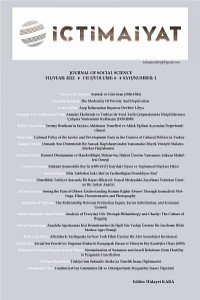Abstract
Medyanın gelişimi üretim ve değişim anlayışını kökünden değiştirdi. Medyaya yönelik eleştirilerim kültürel bir öğe olarak ele alınmaktadır.Bireyler üretim yapmak için teknik bir araç kullanmaktadır. Medya ise bunun için kullanılan bir nesnedir. Modernizm, postmodernism ve metamodernizm gibi kavramların capitalist toplumlarda ortaya çıktığını ifade etmek gerekir. Her kültürün temel gereksinimleri farklı olmasından dolayı bu kavramlar ortaya çıkmıştır. Modernizm salt aklı ortaya koyarken statükocu bir anlayış olmakla itham edildi. Her ne kadar bu eleştirilerin haklılık payı olsa da bazı noktalarda aşırıya giden eleştirilerin olduğunu söyleyebiliriz. Metamodernizm ve postmodernizm gibi kavramlar modeniteyi iyi çözümleyebilmiş olsalarda modernizmin yerine alternatif bir sistem koyamamıştır.Modern toplumlarda öznel ve nesnel ilişkiler piyasa ekonomisi tarafından şekillendirilmektedir.Bundan dolayı ilişkilerde de bir basmakalıplık oluşmaktadır. Çalışmamda tezlerimi konsolide edebilmek için pek çok yerli ve yabancı kaynaklar kullanılmıştır.Sosyal bilimlerin subjektif olmasından dolayı kesin yargılardan kaçınmaya çalıştım. Makalenin amacı insanlığın piyasa ekonomisi kuralları çerçevesinde nasıl bir yöne evrildiğini açıklayabilmektir. Makalenin konusu ise modernizm, post-modernizm ve metamodernizm gibi kavramları açıklayarak medyanın rolünü ortaya koyabilmektir.
Keywords
References
- Pauline, R. (1998). Post Modernizm ve Toplum Bilimleri, Ankara: Ark Yayınları. Smith. D. A. (1995). Toplumsal Değişim Anlayışı, Ankara: Gündoğan Yayınları. Thomson, B.J. (2005). Medya ve Modernite, İstanbul: Kırmızı Yayınları. Topçu, N. (1970). Kapitalizmin Dünyası, Hareket Dergisi, 58.
Abstract
The development of the media has radically changed the understanding of production and change. My criticism of the media is treated as a cultural element. Individuals use a technical tool for production. Media, on the other hand, is an object used for this purpose. It is necessary to state that such concepts as modernism, postmodernism and metamodernism have appeared in capitalist societies. These concepts have arisen due to the fact that the basic requirements of each culture are different. Modernism has been accused of being a status quoist approach while revealing pure reason. Although these criticisms have some justification, we can state that there are some extreme criticisms. Although concepts such as metamodernism and postmodernism were able to analyze modernity well, they could not replace modernism with an alternative system. Several subjective and objective relations are shaped by the market economy in modern societies. Therefore, a stereotype occurs in relations. In order to consolidate my theses, many domestic and foreign sources have been used in my study. Because of the subjective nature of social sciences, I tried to avoid definite judgments.The aim of the article is to explain how humanity has evolved within the framework of market economy rules.The aim of the article is to explain the concepts such as modernism, post-modernism and metamodernism and to reveal the role of the media.
Keywords
References
- Pauline, R. (1998). Post Modernizm ve Toplum Bilimleri, Ankara: Ark Yayınları. Smith. D. A. (1995). Toplumsal Değişim Anlayışı, Ankara: Gündoğan Yayınları. Thomson, B.J. (2005). Medya ve Modernite, İstanbul: Kırmızı Yayınları. Topçu, N. (1970). Kapitalizmin Dünyası, Hareket Dergisi, 58.
Details
| Primary Language | English |
|---|---|
| Journal Section | Orjinal Makale |
| Authors | |
| Publication Date | May 31, 2022 |
| Submission Date | January 22, 2022 |
| Published in Issue | Year 2022 Volume: 6 Issue: 1 |
Içtimaiyat is licensed under a Creative Commons Attribution-NonCommercial 4.0 International License (CC BY NC).
Instagram: @tvictimaiyat


